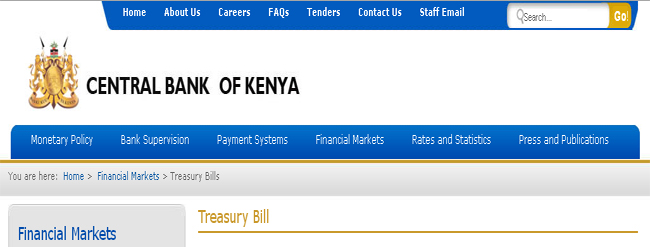Treasury Bills
Follow this step-by-step guide to invest in Treasury bills through the Central Bank:
1. Open a CDS Account
The first step to investing in Treasury bills is to open a CDS account with the Central Bank. It is free to open these accounts, which are how the Central Bank keeps track of who holds which government securities. Once you have your CDS account, which can be opened for an individual or a corporate body, you can invest in multiple Treasury bills and bonds, so you only need to complete this step the first time you’re investing.
To open a CDS account, you need to hold a bank account with a Kenyan commercial bank. You can collect a mandate card from the Central Bank or any of its branches, and must fill it out in neat block letters. You’ll need to provide contact information and information about your commercial bank account. You’ll also need to have to have two signatories from your commercial bank sign the card to verify the information you’ve provided.
You can find sample mandate cards HERE.
When submitting your mandate card, you also need to submit a passport-sized photograph of yourself, which has to be certified and stamped by a representative from your commercial bank.
Finally, you’ll also need to submit a clear copy of your National Identity Card, passport or alien certificate.
Requirements for Individuals Opening CDS Accounts
• Individuals may hold a single or joint CDS account but NO minor accounts.
• Each individual CDS account holder/applicant MUST complete the CDS accounts specimen signature mandate card (the card) which can be collected from any of the Central Bank of Kenya Branches in Nairobi, Mombasa, Kisumu, Eldoret or the Currency Centres in Meru, Nakuru and Nyeri.
• The card(s) should be completed in BLOCK LETTERS, neatly and clearly.
• Names MUST be written in the order that they appear on the identification document.
• NO alternations/errors.
• The card MUST not be folded or disfigured in anyway.
• Signatories to the CDS account will be required to sign the card in the presence of a designated CBK Officer or any Authorised Agent.
• On completion applicants will personally submit the duly completed card(s) together with:
o One recent coloured passport size photograph of the account holder.
o The reverse side of the photograph MUST be certified by the applicants Bankers and stamped.
o The photograph must NOT be stapled or glued to the card.
o The original and clear copy of the National Identity Card/valid passport/alien certificate for verification. (Note that the copies will be retained by CBK.)
• Two signatories of your Bankers, whether a commercial bank or financial institution must sign and stamp the card on the space provided, confirming the bank account details.
Kindly note:
• The commercial bank/financial institution under Note 9 above must be licensed by the Central Bank of Kenya.
• Payments will be made to the Bank account specified in the mandate card.
• On receipt of all the requirements, CDS account application(s) will be processed within seven working days.
• Change of address may be advised through a letter signed by signatories as per the mandate.
• To change details of the CDS account one completes a CDS card and follows all the requirements mentioned from No. 1 to 9.
• For any further clarifications kindly contact us by calling +254 20 2860000, by emailing ndo@centralbank.go.ke or applications@centralbank.go.ke, or by visiting our offices in Nairobi, Kisumu, Mombasa, Meru, Nakuru or Nyeri.
Requirements for Corporate Entities Opening CDS Accounts
• All authorised signatories will be required to complete a mandate card, in this case is the specimen signature mandate card (the card), which can be collected from any of the Central Bank of Kenya Branches in Nairobi, Mombasa, Kisumu, Eldoret or the Currency Centres in Meru, Nakuru and Nyeri.
• The card(s) should be completed in BLOCK LETTERS, neatly and clearly.
• Names MUST be written in the order that they appear on the identification document.
• NO alternations/errors.
• The card MUST not be folded or disfigured in anyway.
• Authorised signatories will be required to sign the card in the presence of a designated CBK Officer or any Authorised Agent.
• On completion, applicants will personally submit the duly completed card(s) together with:
o One recent coloured passport size photograph.
– The reverse side of the photograph MUST be certified by the applicants Bankers and stamped.
– The photograph must NOT be stapled or glued to the card.
o Originals and copies of the following documents for certification (Note that the copies will be retained by CBK):
– Certificate of incorporation and/or valid licence and/or certification of registration.
– Minutes/extract of minutes of Board resolution authorising investment in Kenya Government Securities, stating the authorised signatories for the account, including their names and identification numbers.
– National Identity card, valid passport or alien certificate for the authorised signatories. For foreigners a valid work permit should be included.
– Audited report for the last financial year.
– Tax exemption certificate from Kenya Revenue Authority (if applicable).
• Emboss corporate seal on all the CDS card(s).
• Two signatories of your Bankers, whether a commercial bank or financial institution, must sign and stamp the card on the space provided, confirming the Bank account details.
Kindly note:
• The commercial bank/financial institution under Note 9 above must be licensed by the Central Bank of Kenya.
• Payments will be made to the bank account specified in the mandate card.
• On receipt of all the requirements, CDS account application(s) will be processed within seven working days.
• Change of address may be advised through a letter signed by signatories as per the mandate.
• To change details of the CDS account one completes a CDS card and follows all the requirements mentioned from No. 1 to 10.
• For any further clarifications kindly contact us by calling +254 20 2860000, by emailing ndo@centralbank.go.ke or applications@centralbank.go.ke, or by visiting our offices in Nairobi, Kisumu, Mombasa, Meru, Nakuru or Nyeri.
2. Decide How You Want to Invest
Treasury bills are offered every week, with maturities of 91 days, 182 days and 364 days. This means that when you are ready to invest, you will be able to choose from one of those options.
Find the Treasury bills on offer this week HERE.
You should decide on a maturity length based on the recent interest rates, which can give you an idea of what to expect in upcoming auctions, and based on how long you can commit your funds for.
The minimum face value purchase for Treasury bills is Kshs. 100,000, and you must invest in denominations of Kshs. 50,000. Because Treasury bills are sold at a discount, this face value amount is what you will receive at the end of the 91, 182 or 364 day maturity. Your initial investment will be less than the face value.
3. Complete and Submit an Application Form
When you are ready to invest, you need to complete a Treasury bill application form.
This includes information about the Treasury bill you want to purchase, like the issue number, the maturity period you want, and the face value amount you want to receive upon maturity. It also includes information about yourself, including your names, telephone number, CDS account number, and whether the funds you are investing are coming from a local or offshore source.
On the application form, you have two options for selecting a rate, which determines how much you will pay for the bill and, therefore, what your return will be when the bill matures. You should select either the Interest/Competitive Rate or the Non-Competitive/Average Rate.
Investors choosing the Interest/Competitive Rate bid on the Treasury bills by submitting interest rates they would like to pay. The Central Bank then decides what bids it will accept and determines a cutoff. Investors who submitted interest rates above that cutoff do not receive Treasury bills from that auction.
Investors who choose the Non-Competitive/Average Rate are guaranteed to receive Treasury bills from the auction, but their interest rate is a weighted average of the accepted bids from the investors who entered Interest/Competitive rates. While they are guaranteed to receive a bill, the maximum face value for Non-Competitive/Average Rate applications is Kshs. 20 million.
The final section on the application form is the Rollover Instructions. To easily facilitate re-investment, investors with maturing bills and bonds can use their returns to purchase further government securities.
You can find a sample Treasury Bill Application Form HERE.
You must submit your application form to the Central Bank’s head office or one of its branches by 2pm on Wednesday for 182- and 364-day bills and by 2pm on Thursday for 91-day bills.
4. Get the Auction Results
The Central Bank’s Auction Management Committee (AMC) meets at 4pm on auction days, and after considering all received bids, determines the cut-off rate and the successful weighted average of the accepted bids. The results from the auction are published, both in a daily newspaper and in our statistics section. While investors will typically receive Treasury bills in the amount they applied for, the Central Bank can issue bills for a lower amount.
Following the auction, investors need to call or visit the Central Bank or its branches to determine if their applications were successful and to determine how much they owe for their Treasury bills.
If you have submitted an application, it is extremely important that you contact the Central Bank to determine what your payment will be, as you will need to make that payment by 2pm on the following Monday or, if the Monday is a public holiday, the following Tuesday.
5. Payment
The payment period for an auction typically closes on the following Monday at 2pm. Investors can submit their payments, in the amounts specified when they contact the Central Bank, through cash or banker’s cheques for amounts under Kshs. 1 million and through a KEPSS transfer for larger amounts.
Successful applicants who fail to submit payments within the payment period can be barred from future investment in government securities.
6. Maturity Proceeds:
At the end of the 91-, 182- or 364-day period, the face value amount of the bill will be remitted into the commercial bank account indicated on the CDS account. Alternatively, An Investor may choose to rollover their securities into a new forthcoming issue and in this case, they have to complete application form giving rollover instructions and submit to Central Bank before closure of the period of sale for that bill. The maturity date of the maturing security (investment) and the value date of the new Treasury bill MUST match for rollover instruction to be successful. The Bank therefore does not remit maturing proceeds into investor’s bank account but rather sends only refund amounts generated from the new investment.




